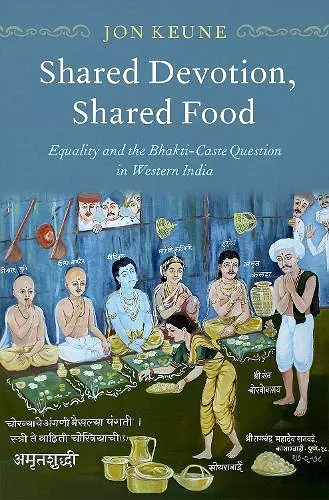Shared Devotion, Shared Food
Equality and the Bhakti-Caste Question in Western India
Format:Hardback
Publisher:Oxford University Press Inc
Published:30th Sep '21
Should be back in stock very soon

When Hindu devotional or bhakti traditions welcomed marginalized people-women, low castes, and Dalits-were they promoting social equality? In this book, Jon Keune deftly examines the root of this deceptively simple question. The modern formulation of the bhakti-caste question is what Dalit leader B. R. Ambedkar had in mind when he concluded that the saints promoted spiritual equality but did not transform society. While taking Ambedkar's judgment seriously, Jon Keune argues that, when viewed in the context of intellectual history and social practice, the bhakti-caste question is more complex. Shared Devotion, Shared Food explores how people in western India wrestled for centuries with two competing values: a theological vision that God welcomes all people, and the social hierarchy of the caste system. Keune examines the ways in which food and stories about food were important sites where this debate played out, particularly when people of high and low social status ate together. By studying Marathi manuscripts, nineteenth-century publications, plays, and films, Shared Devotion, Shared Food reveals how the question of caste, inclusivity, and equality was formulated in different ways over the course of three centuries, and it explores why social equality remains so elusive in practice.
Through a detailed study of commensality practices, Keune offers a brilliant historical analysis of the relationship between bhakti traditions and the reality of caste hierarchies. * Anantanand Rambachan, Professor of Religion, Saint Olaf College *
This gem of a book explores the relationship between inclusive religious imagery and the hard realities of social hierarchy. In a tour de force of textual analysis, Jon Keune critically and meticulously compares multiple versions of stories about Eknath, a 16th-century bhakti saint, in plays and movies as well as in traditional texts. Using the narratives as a prism, Keune examines an astonishingly broad spectrum of topics: from the social significance of sharing food to the modern intellectual history of Eknath's region, trends in scholarship on bhakti, and even the very notion of equality itself. * Anne Feldhaus, Professor Emerita, Arizona State University *
Keune brings insight and humor to this study of how sharing food across religious spaces in sacred biographies and devotional texts reveals important considerations about social equality and caste, which he evocatively calls 'the bhakti-caste question'. Spanning archives, literature, manuscripts, visual culture, and ethnography, Keune delves deeply into the possible ethics of devotionalism in India over several centuries, and this book should be of interest to anyone who cares about the politics of power at the intersections of religion, food, and society. * Christian Lee Novetzke, author of The Quotidian Revolution and Professor of South Asia Studies, Comparative Religion, and Global Studies, University of Washington *
It is a useful tool in the classroom to think about the nuances of representation and authorial intention in religious narratives. * Janani Mandayam Comar, Religious Studies Review *
This volume is a master class in the study of hagiographical literature. Hagiographical analysis usually focuses on written text and views a single rendition of a story as a "self-contained snapshot," but Keune shows the value in approaching each story as "one scene in a sequence of film frames" to take account of "the effects of time and changing context on how a story gets told". With his "hagiography in 4D" approach, one can attend to the vitality and dynamism of stories as they move, over generations, across many media forms, always serving as points of orientation for living traditions. * Patton Burchett, Reading Relligion *
ISBN: 9780197574836
Dimensions: 160mm x 241mm x 28mm
Weight: 680g
332 pages